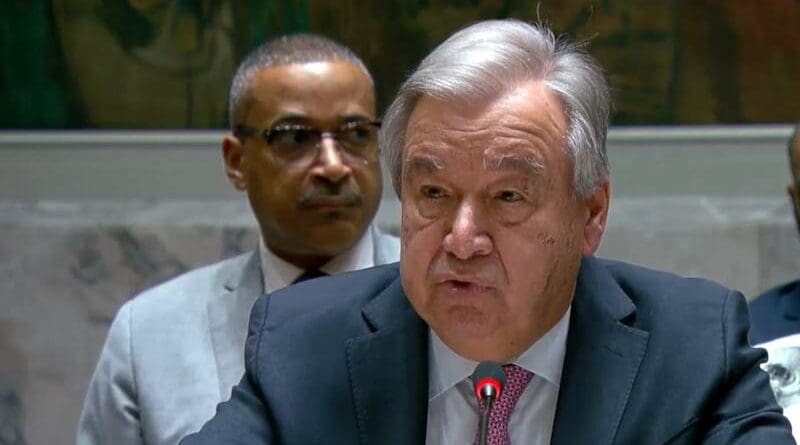
Banning Diplomacy: Israel’s Ban On Guterres And The Future Of Middle East Peace – OpEd
In an extraordinary diplomatic move, Israel has declared United Nations Secretary-General António Guterres “persona non grata,” effectively banning him from entering the country.
The decision comes amid escalating violence in the Middle East, with tensions flaring between Israel, Hamas, Hezbollah, and Iran. By blocking Guterres, Israel has intensified an already precarious situation, raising questions about its relationship with the UN, the role of diplomacy in conflict resolution, and the broader implications for peace efforts in the region.
Why Did Israel Ban the UN Chief?
The immediate trigger for the ban was Guterres’ speech to the UN Security Council in which he called for de-escalation in the region, condemning violence on all sides without directly naming Iran for its missile strikes on Israel. For Israel, this neutrality was seen as unacceptable. Israeli Foreign Minister Israel Katz accused Guterres of failing to condemn Iran—viewed by Israel as the orchestrator behind the recent violence, with its backing of Hamas and Hezbollah.
The broader context of this decision is Israel’s long-standing dissatisfaction with what it perceives as the UN’s bias against it. Israel has often accused the UN of disproportionately focusing on Palestinian rights and overlooking the threats posed by groups like Hamas and Hezbollah. Guterres’ recent statements aimed at balancing calls for peace with critiques of all parties involved were perceived by Israel as insufficient in recognizing its security concerns, especially in light of the deadly Hamas attacks on October 7, which resulted in over 1,200 Israeli casualties.
A First in Diplomacy?
This unprecedented ban marks the first time a sitting UN Secretary-General has been barred from a member state. While tensions between Israel and the UN have persisted for decades, no previous Secretary-General has been excluded in this way. The UN Charter, under Article 100, mandates the neutrality of the Secretary-General, stating that member states must respect the international nature of the office and refrain from interfering with its work. By banning Guterres, Israel has breached a fundamental norm of international diplomacy, raising serious questions about the future of Israel-UN relations.
Historically, the UN has played a pivotal role in mediating conflicts, particularly in volatile regions like the Middle East. Previous Secretaries-General, such as Dag Hammarskjöld during the 1956 Suez Crisis or Kofi Annan during the Second Intifada, have navigated extremely tense situations without being barred from key member states. Israel’s move to declare Guterres “persona non grata” undermines the very principles of diplomacy and multilateral engagement that the UN represents.
Israel’s Friction with the UN
The ban on Guterres is not an isolated incident but part of a long history of strained relations between Israel and the UN. Despite the UN’s instrumental role in the creation of Israel in 1948, relations soured as the Arab-Israeli conflict intensified. Over the years, numerous UN resolutions have condemned Israeli settlement activity, the occupation of Palestinian territories, and violations of international law, which Israeli leaders have long viewed as unfair and biased.
A major point of contention has been the UN’s approach to Israel regarding the Israel-Palestine conflict. In particular, the United Nations Relief and Works Agency for Palestine Refugees in the Near East (UNRWA) has drawn significant criticism from Israel, which argues that the agency exacerbates the Palestinian refugee crisis and encourages anti-Israel sentiment. More broadly, Israel has often pointed to the UN’s inability to effectively address the threats posed by militant groups like Hamas and Hezbollah, which receive significant backing from Iran.
The current crisis has only deepened these tensions. Israel sees itself as facing an existential threat from Iran’s influence in the region, especially with Tehran’s support of groups like Hamas in Gaza and Hezbollah in Lebanon. The failure of the international community, particularly the UN, to decisively condemn Iran’s role has exacerbated Israel’s frustrations.
Guterres’ Call for Peace: A ‘Sickening Cycle of Escalation’
In reaction to the ban, Guterres reaffirmed his condemnation of violence from all parties and urged an immediate ceasefire to halt the “sickening cycle of escalation” in the region. His statements underscore the worsening humanitarian crisis in Gaza, where Israeli airstrikes have resulted in thousands of deaths, including a substantial number of civilians. Guterres has consistently emphasized the need to protect civilian lives, asserting that both sides bear a responsibility to uphold international humanitarian law.
Guterres’ balanced approach—condemning Hamas’ actions while also criticizing Israel’s military response—reflects the UN’s longstanding position on the conflict. However, this neutrality is precisely what Israel finds problematic. At a time when Israeli leaders are facing unprecedented security threats, they expect unequivocal support from the international community, particularly in their fight against groups like Hamas and Hezbollah.
International Reaction and Diplomatic Fallout
Israel’s decision to ban Guterres has sparked significant international concern. Several members of the UN Security Council, including European powers like France and the UK, expressed dismay over Israel’s actions. In a rare moment of consensus, the Council issued a statement reaffirming their support for Guterres and condemning the decision to bar him. While the United States, a key ally of Israel, stopped short of outright condemnation, it described the ban as “unhelpful” and urged Israel to engage diplomatically with the UN.
Regional powers like Egypt and Jordan, both of which have played critical roles in past peace negotiations, also voiced concern that Israel’s ban on Guterres could derail future mediation efforts. These countries have a vested interest in stabilizing the region, and any move that undermines diplomatic channels is viewed as a setback.
Within Israel, the ban has polarized public opinion. While many Israelis support their government’s hardline stance against what they see as UN bias, others fear that cutting off diplomatic engagement with the international community could isolate Israel at a time when it needs allies the most.
A Dangerous Precedent for Diplomacy
Israel’s ban on Guterres could set a dangerous precedent for international diplomacy. The role of the UN Secretary-General is to act as a neutral mediator in global conflicts, and by denying him access, Israel risks further eroding the authority of multilateral institutions. At a time when the Middle East is already engulfed in violence, sidelining diplomacy threatens to worsen an already catastrophic situation.
The ban also raises the question of how other countries might respond to UN criticism in future conflicts. If Israel can bar the UN’s top diplomat without consequence, what’s to stop other nations from doing the same? Such actions undermine the principles of international diplomacy, where dialogue, even amid disagreements, remains essential.
Diplomatic Isolation or Engagement?
Israel’s decision to ban António Guterres highlights the deepening rift between the country and the UN, but it also underscores a larger problem—the erosion of diplomacy in the face of escalating violence. By sidelining the UN’s top diplomat, Israel risks not only isolating itself but also weakening the very institutions that could help broker peace in the region.
At a moment when the Middle East is on the brink of wider conflict, diplomacy is needed more than ever. The “sickening cycle of escalation” that Guterres warned about cannot be stopped without dialogue. Israel’s ban, however, suggests that diplomacy may be becoming another casualty of this long-standing conflict.
United Nations Secretary-General António Guterres Photo Credit: UN

Debashis Chakrabarti
Debashis Chakrabarti is an international media scholar and social scientist, currently serving as the Editor-in-Chief of the International Journal of Politics and Media. With extensive experience spanning 35 years, he has held key academic positions, including Professor and Dean at Assam University, Silchar. Prior to academia, Chakrabarti excelled as a journalist with The Indian Express. He has conducted impactful research and teaching in renowned universities across the UK, Middle East, and Africa, demonstrating a commitment to advancing media scholarship and fostering global dialogue.
No comments:
Post a Comment